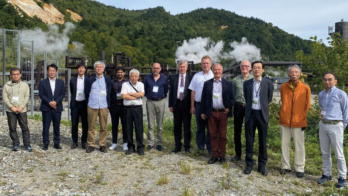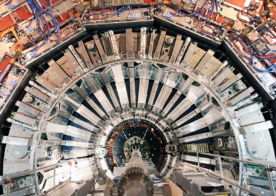CERN’s director-general, Rolf Heuer, looks beyond the results announced on 4 July to a wider significance.

On 4 July 2012, particle physics was headline news around the world thanks to a scientific success story that began over 60 years ago. It was a great day for science and a great day for humanity: a symbol of what people can achieve when countries pool their resources and work together, particularly when they do so over the long term.
This particular success story is called CERN, a European laboratory for fundamental research born from the ashes of the Second World War with support from all parties, in Europe and beyond. The headline news was the discovery of a particle consistent with the long-sought after Higgs boson, certainly a great moment for science. In the long term, however, the legacy of 4 July may well be that CERN’s global impact endorses the model established by the organization’s founding fathers in the 1950s and shows that it still sets the standard for scientific collaboration today. CERN’s success exemplifies what people can achieve if we keep sight of the vision that those pioneers had for a community of scientists united in diversity pursuing a common goal.
CERN is a European organization, founded on principles of fairness to its members and openness to the world. Accordingly, its governance model gives a fair voice to all member states, both large and small. Its funding model allows member states to contribute according to their means. Its research model welcomes scientists from around the world who are able to contribute positively to the laboratory’s research programmes. Through these basic principles, CERN’s founding fathers established a model of stability for cross-border collaboration in Europe, for co-ordinated European engagement with the rest of the world, and they laid down a blueprint for leadership in the field of particle physics. The result is that today, CERN is undisputedly the hub of a global community of scientists advancing the frontiers of knowledge. It is a shining example of what people can do together.
This fact has not been lost on other fields and over the years several European scientific organizations have emulated the CERN model. The European Space Agency (ESA) and European Southern Observatory (ESO), for example, followed CERN’s example and have also established themselves as leaders in their fields. Today, those thinking of future global science projects look to the CERN model for inspiration.
Scientific success stories like this are now more important then ever. At a time when the world is suffering the worst economic crisis in decades, people – particularly the young – need to see and appreciate the benefits of basic science and collaboration across borders. And at a time when science is increasingly estranged from a science-dependent society, it is important for good science stories to make the news and encourage people to look beyond the headlines. For these reasons, as well as the discovery itself, 4 July was an important day for science.





